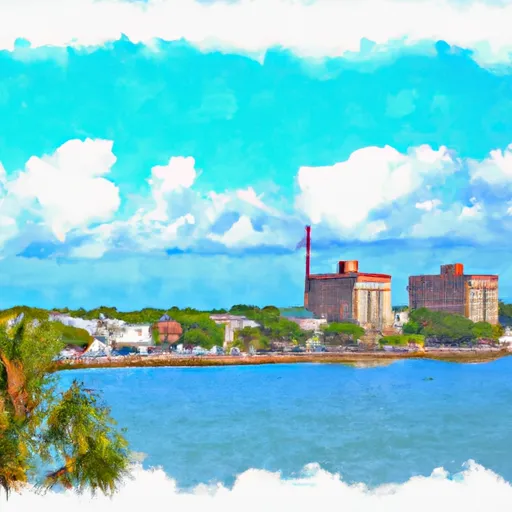-
 Snoflo Premium
Snoflo Premium
Get unlimited access to all our content
With no Ad interruptions! - Start Your Free Trial Login with existing account
Jekyll-Island
Eden Index
Climate
8.0
•
Recreation
5.9
•
Community
•
Safeguard
5.2/10

Jekyll Island is a beautiful barrier island located off the coast of Georgia, known for its mild climate, diverse ecosystems, and outdoor recreation opportunities. The island experiences a humid subtropical climate, characterized by hot and humid summers, with temperatures ranging from the mid-80s to low 90s Fahrenheit, and mild winters, with temperatures ranging from the mid-50s to low 60s Fahrenheit.
The island's hydrology is influenced by the surrounding marshes and tidal creeks. These marshes act as natural filters, purifying the water that eventually reaches the beaches. The constituents of the island's hydrology include coastal marshes, tidal creeks, and a vast array of marine and plant life, making it a haven for nature enthusiasts and birdwatchers.
Jekyll Island offers a variety of outdoor recreation opportunities. Visitors can explore the island's 20 miles of biking and hiking trails, go kayaking or paddleboarding in the tidal creeks, or simply relax on the pristine beaches. The island also boasts three 18-hole golf courses, tennis courts, and opportunities for fishing and boating. Additionally, Jekyll Island has preserved its historic district, offering a glimpse into the island's rich history through guided tours and museums. With its pleasant climate, diverse hydrology, and abundant recreational activities, Jekyll Island is a popular destination for nature lovers and outdoor enthusiasts.
What is the Eden Index?
The Snoflo Eden Index serves as a comprehensive rating system for regions, evaluating their desirability through a holistic assessment of climate health, outdoor recreation opportunities, and natural disaster risk, acknowledging the profound impact of these factors on livability and well-being.
Climate Health Indicator (CHI): 8.0
Jekyll-Island receives approximately
1213mm of rain per year,
with humidity levels near 85%
and air temperatures averaging around
20°C.
Jekyll-Island has a plant hardyness factor of
9, meaning
plants and agriculture in this region tend to thrive here all year round.
By considering the ideal temperature range, reliable water supplies, clean air, and stable seasonal rain or snowpacks, the Climate Health Indicator (CHI) underscores the significance of a healthy climate as the foundation for quality living.
A healthy climate is paramount for ensuring a high quality of life and livability in a region, fostering both physical well-being and environmental harmony. This can be characterized by ideal temperatures, reliable access to water supplies, clean air, and consistent seasonal rain or snowpacks.
Weather Forecast
Streamflow Conditions
St. Marys - Satilla
Area Rivers
St. Marys - Satilla
Snowpack Depths
St. Marys - Satilla
Reservoir Storage Capacity
St. Marys - Satilla
Groundwater Levels
Recreational Opportunity Index (ROI): 5.9
The Recreational Opportunity Index (ROI) recognizes the value of outdoor recreational options, such as parks, hiking trails, camping sites, and fishing spots, while acknowledging that climate plays a pivotal role in ensuring the comfort and consistency of these experiences.
Access to outdoor recreational opportunities, encompassing activities such as parks, hiking, camping, and fishing, is crucial for overall well-being, and the climate plays a pivotal role in enabling and enhancing these experiences, ensuring that individuals can engage in nature-based activities comfortably and consistently.
Camping Areas
| Campground | Campsites | Reservations | Toilets | Showers | Elevation |
|---|---|---|---|---|---|
| Little Talbot Island State Park | None | 15 ft | |||
| Huguenot City Park | 40 | 10 ft | |||
| Hanna City Park | 300 | 17 ft | |||
| Pelican Roost RV Military - Mayport NS | None | 14 ft | |||
| Osprey Cove Military - Mayport NS | None | 15 ft | |||
| Faver - Dykes State Park | None | 9 ft | |||
| Anastasia State Park | 139 | 10 ft | |||
| Fort Clinch State Park | None | 14 ft | |||
| Crooked River State Park | None | 14 ft | |||
| Princess Place Preserve | None | 5 ft |
Catastrophe Safeguard Index (CSI):
The Catastrophe Safeguard Index (CSI) recognizes that natural disaster risk, encompassing floods, fires, hurricanes, and tornadoes, can drastically affect safety and the overall appeal of an area.
The level of natural disaster risk in a region significantly affects safety and the overall livability, with climate change amplifying these risks by potentially increasing the frequency and intensity of events like floods, fires, hurricanes, and tornadoes, thereby posing substantial challenges to community resilience and well-being.
Community Resilience Indicator (CRI):
The Community Resilience Indicator (CRI) recognizes that education, healthcare, and socioeconomics are crucial to the well-being of a region. The CRI acknowledges the profound impact of these elements on residents' overall quality of life. By evaluating educational resources, healthcare accessibility, and economic inclusivity, the index captures the essential aspects that contribute to a thriving community, fostering resident satisfaction, equity, and social cohesion.

